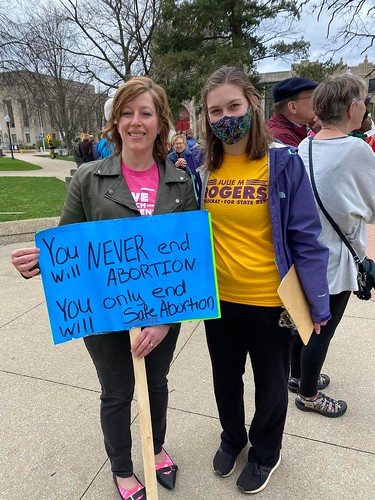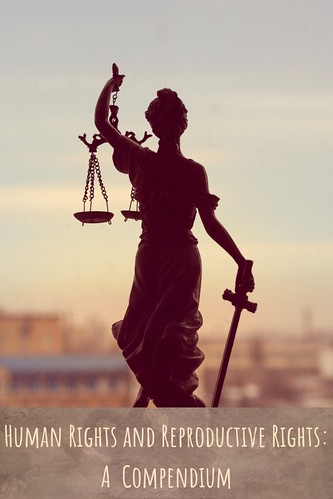Without nationally governing legislation, the United States is one of only 14 countries globally in which reproductive rights can vary across state lines. The overturning of Roe v. Wade on June 24th, 2022 plunged the American reproductive healthcare system into deep uncertainty, as well as subsequently violating several human rights, such as:
Universal Declaration of Human Rights,
Article 3, Everyone has the right to life, liberty and the security of person.
UDHR Article 5, No one shall be subjected to torture or to cruel, inhuman or degrading treatment or punishment.
UDHR Article 12, No one shall be subjected to arbitrary interference with his privacy, family, home or correspondence, nor to attacks upon his honour and reputation. Everyone has the right to the protection of the law against such interference or attacks.

With legal proceedings still ongoing in many places, the Guttmacher Institute predicts that 26 states will move to criminalise abortion, with 22 states already having pre-exiting legislation in place to ban the practice. One such state that is currently grappling with legislation that predates the protection of Roe v. Wade is Michigan. With over 10 million residents, it is imperative that reproductive freedoms within the state are guaranteed for all, by law, and without question.
Michigan Democratic State Representative Julie Rogers is one of those campaigning in favour of promoting and protecting reproductive rights.

Democratic Representative Julie Rogers

State Representative Julie Rogers is serving in her first term representing the 60th House District, which includes the City of Kalamazoo and portions of the City of Portage and Kalamazoo Township. She is a practicing physical therapist and served on the Kalamazoo County Commission for 8 years, including serving as Board Chair. She was appointed to serve as Assistant Democratic Floor Leader as well as the following committees: House Committee on Financial Services; Democratic Vice Chair to the House Committee on Military, Veterans and Homeland Security; House Appropriations Committee; House Appropriations Environment, Great Lakes and Energy subcommittee; and Democratic Caucus Committee on Diversity, Equity and Inclusion. She also serves as a co-chair for the Legislative Arts & Culture Caucus.
Rep. Rogers grew up in Kalamazoo County and is a proud graduate of public schools. She later attended Marquette University and earned a Master’s Degree in Physical Therapy. Her 22-year career as a physical therapist has led her to become a champion of public health, serving on the National Association of Counties Health Steering Committee for seven years. Rogers has been recognized for her work with a nomination to the Class of 2019 Women in Government, a national nonpartisan leadership program for women elected officials of all levels of government.
Rogers lives in Kalamazoo with her husband Dr. Ed Orloff, where they enjoy participating in community runs and triathlons.
Representative Rogers has already sponsored or co-sponsored several bills which promote and protect reproductive freedoms, including:
MI HB5542 - A bill to establish certain rights related to abortion and reproductive health; to regulate the performance of abortions under certain circumstances; to provide for the powers and duties of certain state and local governmental officers and entities; to provide remedies; and to repeal acts and parts of acts.
HR 19 - A resolution to recognize the 48th anniversary of the issuance of the U.S. Supreme Court’s Roe v. Wade ruling.

In addition to improving healthcare, Representative Rogers also prioritises protecting the environment, inclusivity, and strengthening the infrastructure of Michigan. Her vocal support for reproductive rights is further strengthened by being a member of Michigan Progressive Women’s Caucus. By encouraging women’s inclusion and participation in policy, education, and advocacy, the group has contributed to a range of legislative improvements. This includes protecting essential care through the Reproductive Health Act, a legal assurance of freedom for all to make decisions about their own reproductive health.
What is Michigan’s current position on reproductive rights?
After enjoying decades of protection, the overturning of Roe v. Wade saw reproductive rights in Michigan come immediately under threat. Without the specific protection it gave, abortion services were set to fall under Act 328 of the 1931 Michigan Penal Code instead. This legislation prohibits abortion at a state level, with no exceptions made for cases of rape or incest.

To stop the immediate implementation of Act 328, Michigan Governor Gretchen Whitmer, along with Planned Parenthood of Michigan, filed suits against the incoming abortion ban, with Whitmer using her authority to go straight to Michigan’s Supreme Court. Whilst a preliminary injunction has been granted, Michigan’s reproductive rights remain far from safe.
As with Roe v. Wade, Michigan courts are now set to investigate whether the right to abortion is protected under the state’s constitution. However, in the upcoming November 8th 2022 election, Michigan residents will have the opportunity to vote on Proposal 3. If given a ‘yes’ vote, this would amend the Michigan constitution and specifically enshrine reproductive freedoms within it, removing the requirement for any further court involvement.
What is Proposal 3, and why is it so important?
If approved, in addition to restoring the reproductive freedoms that Roe v. Wade provided, Prop 3 would ensure that every person has unquestioned and legal access to a range of reproductive health care. By amending the Michigan constitution, reproductive rights would enjoy an additional level of protection that was not provided before the overturning of Roe v. Wade.
A "yes" vote would support providing a state constitutional right to reproductive freedom, which is defined as "the right to make and effectuate decisions about all matters relating to pregnancy, including but not limited to prenatal care, childbirth, postpartum care, contraception, sterilization, abortion care, miscarriage management, and infertility care.”
A "no" vote would oppose providing a state constitutional right to reproductive freedom.

Recently, I was given the great opportunity to talk with Representative Rogers to discuss her thoughts on reproductive rights, Proposal 3, and how best to further reproductive rights in Michigan. Here's what she had to say...
Please tell us a little about the work that you do, or are hoping to do for reproductive rights. Are there specific goals that are being worked towards in Michigan?
I am a member of the Progressive Women’s Caucus, which educates Michigan legislators and the public about reproductive rights and champions legislation aimed at promoting reproductive rights.I have attended their meetings and news conferences, and been a part of several of their bill packages. I recently introduced HB 6366, which would require health insurance companies to provide a 12-month supply of contraception upon request.
What is your position on proposal 3? And, post Roe V. Wade, to what extent are reproductive freedoms vital to ensure via legislation?
I signed the petition to place Proposal 3 on the ballot and am a strong supporter of it. We have introduced HB 5542, the Reproductive Health Act in the Michigan House, and I was a proud co-sponsor.
After receiving a record number of signatures to qualify for the ballot, support for proposal 3 is clear. However, should it not be passed, what is the next step in Michigan to provide reproductive care?
Work to pass legislation that repeals the 1931 law and enshrines reproductive freedoms in Michigan law.
In the lead up to the November 8th vote, the division on reproductive rights is apparent, both within Michigan and more widely within the United States. As a State Representative, what are the barriers that you face most often in your work in this area?
Abortion is a very personal issue, and the topic is filled with emotion on both sides. Historic language about this topic has not been helpful. How we talk about reproductive freedom matters. Additionally, I am serving at a time of record incivility and violence toward elected officials. This adds to the lack of civil discourse, particularly on “hot-button” topics.
In 2021, you cosponsored House Resolution 19, to recognise the 48th anniversary of the ruling of Roe v. Wade. Why is it so important to keep Roe v. Wade central to current discussions?
Roe was upheld for 49 years and was the centerpiece of reproductive rights and freedoms. It was the culmination of the work of generations of individuals from all walks of life fighting for bodily autonomy. We must keep uplifting it, as it is central to the fight for these rights and freedoms.
What inspires the work that you do?
I am a healthcare provider (physical therapist) in addition to being a legislator. I have heard some heartbreaking stories from some of my patients who did not have access to reproductive health care. No two pregnancies are the same, and no one needs or wants politicians making medical decisions for them. These stories inspire me every day.
What would your advice be to anybody in Michigan who is currently unsure, or struggling with their reproductive rights?
Listen to individuals’ stories about their experiences and commit to having civil dialogue.
How can people find your work?
My official facebook is State Representative Julie M. Rogers and my website is www.housedems.com/Julie-rogers
To access more information on reproductive rights in Michigan:
Planned Parenthood of Michigan
Telephone - 734-926-4800
Family Planning Michigan
Website - https://www.michigan.gov/mdhhs/adult-child-serv/childrenfamilies/familyhealth/familyplanning
Email - MDHHS-ReproductiveHealthUnit[at[michigan.gov
Please click the photo below for a compendium of my Human Rights and Reproductive Rights columns:
Emma Fitzsimmons is the Human Rights and Reproductive Rights Editor at Wandering Educators. Motivated by the desire to make a positive impact in the world, she recently completed a masters degree in Human Rights and Diplomacy. She is very passionate about reproductive rights and the equality of all people.

